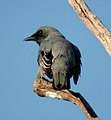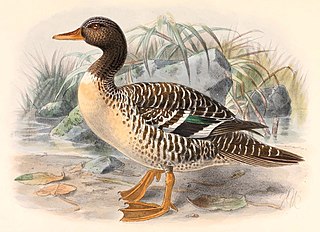
Salvadori's teal or Salvadori's duck, is a species of bird endemic to New Guinea. It is placed in the monotypic genus Salvadorina.
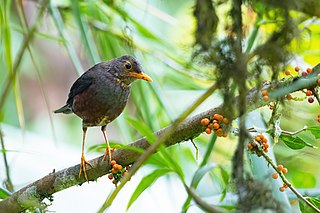
The island thrush is a common forest bird in the thrush family. Almost 50 subspecies have been described, ranging from South East Asia and Melanesia, to Samoa, exhibiting great differences in plumage. Several subspecies are threatened and three have already become extinct.

The Amboyna cuckoo-dove is a dove in the genus Macropygia found in the Moluccas and New Guinea. It was one of three new species defined when the slender-billed cuckoo-dove was split up in 2016 and retains the Latin binomial of the former species.[1]
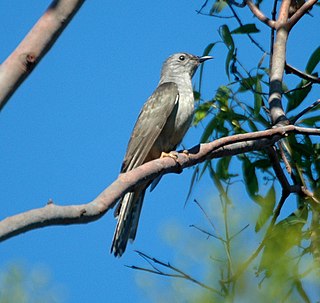
The brush cuckoo is a member of the cuckoo family.

The rusty pitohui is a species of bird in the family Pachycephalidae. It is found throughout the lowlands of the Aru Islands and New Guinea.

Blyth's hornbill, also known as the Papuan hornbill, is a large hornbill inhabiting the forest canopy in Wallacea and Melanesia. Its local name in Tok Pisin is kokomo.

The little bronze cuckoo is a species of cuckoo in the family Cuculidae. It is found in Southeast Asia, New Guinea and northern and eastern Australia, where its natural habitat is subtropical or tropical moist lowland forest. It is the world's smallest cuckoo, at 17 grams (0.60 oz) and 15 cm (6 in). The subspecies rufomerus and crassirostris are sometimes given specific status.

The red-cheeked parrot is a species of parrot in the family Psittaculidae found in Indonesia, Papua New Guinea and the tip of northern Australia. There are 17 subspecies currently recognized. It is a stocky short-tailed parrot with predominantly green plumage. It exhibits sexual dimorphism; the adult male has red cheeks and a mauve nape and top of head, while the female is duller with a brown head.

The Sulawesi cicadabird is a species of bird in the family Campephagidae. It is endemic to Sulawesi in Indonesia. Its natural habitats are subtropical or tropical moist lowland forests and subtropical or tropical moist montane forests. The species is placed in the reinstated genus Edolisoma by some authors and the nominate subspecies E. morio morio was suggested to be part of the Edolisoma tenuirostre complex in a molecular phylogenetic study by Pedersen et al. (2018).

The white-bellied cuckooshrike is a species of bird in the family Campephagidae. It is found in Australia, the Moluccas, New Guinea and the Solomon Islands.

The spectacled monarch is a species of bird in the family Monarchidae. It is found in Australia, Indonesia, and Papua New Guinea. Its natural habitats are subtropical or tropical moist lowland forests, subtropical or tropical mangrove forests, and subtropical or tropical moist montane forests.
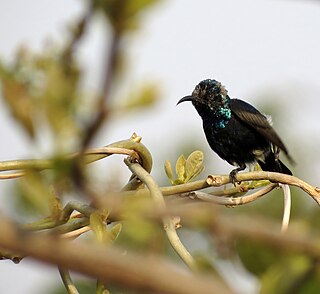
The black sunbird is a species of bird in the family Nectariniidae. It is found in eastern Indonesia and New Guinea. Its natural habitats are subtropical or tropical moist lowland forest and subtropical or tropical mangrove forest.

The grey whistler or brown whistler, is a species of bird in the family Pachycephalidae. It is found in northern Australia and New Guinea. Its natural habitats are subtropical or tropical moist lowland forest and subtropical or tropical mangrove forest.
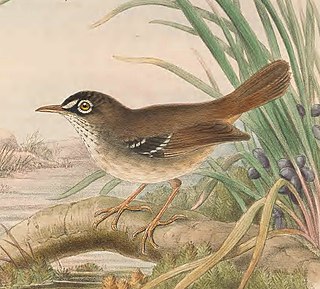
The tropical scrubwren or Beccari's scrubwren is a bird species. Placed in the family Pardalotidae in the Sibley-Ahlquist taxonomy, this has met with opposition and indeed is now known to be wrong; they rather belong to the independent family Acanthizidae.
The grey-capped cicadabird or Melanesian cicadabird is a species of bird in the family Campephagidae. It is endemic to the Bismarck Archipelago. It was previously considered conspecific with the common cicadabird.

The variable goshawk is a bird of prey native to Indonesia, Papua New Guinea and the Solomon Islands. It was recently elevated to species status, and was previously lumped together with the grey goshawk.

Edolisoma is a genus of birds in the cuckooshrike family Campephagidae that are native to the Central Indo-Pacific region, Australia and New Guinea.
The Louisiade fantail is a species of bird in the family Rhipiduridae that is endemic to the D'Entrecasteaux Islands and the Louisiade Archipelago to the east of New Guinea. This species was formerly considered to be a subspecies of the Australian rufous fantail.

The Solomons rufous fantail is a species of bird in the family Rhipiduridae that is endemic to the Solomon Islands. It was formerly considered to be a subspecies of the Australian rufous fantail.


